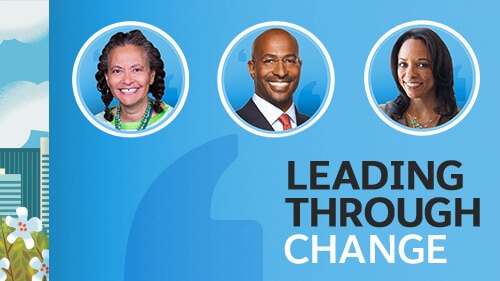Among the many tragedies of COVID-19, none is more devastating — or personal — to me than how it impacts people of color. A Washington Post analysis revealed that majority-black communities suffer 3x the rate of infections and almost 6x the rate of deaths as majority-white communities. In places such as Chicago and Louisiana, African Americans account for 67% and 70% of COVID-19-related deaths respectively, while they represent only 32% of the population.
These statistics are upsetting, but they shouldn’t come as a surprise. History shows us health crises like COVID-19 — and natural disasters, like what we experienced with Hurricane Katrina — affect communities of color more than any other population. But why does this continue to happen, and how do we make it stop?
This week, to cut through the misinformation that surrounds this topic, I convened three experts whose voices I trust:
- Dr. Camara Jones, family physician, and epidemiologist
- Van Jones, CEO of REFORM Alliance and CNN contributor
- Ellen McGirt, journalist, and Fortune Senior Editor and author of raceAhead
Through our Leading Through Change virtual event, we looked at what happens when two global crises collide, what it reveals about our society, and what we can do to make change.
“We have a pandemic that is jumping on top of multiple existing pandemics: poverty, bad housing, bad jobs, epidemics of hypertension, obesity, diabetes, and others,” states Van Jones. “We have sick systems that have allowed certain kinds of disadvantages to accumulate.”
Dr. Camara Jones has spent her career helping people name, measure, and address racism. She is clear racism is a system, not an individual character flaw, or personal moral failing. Racism structures opportunity and assigns value in our country, based on the social interpretation of how one looks (which is what we call race). It disadvantages some individuals and communities, advantages other individuals and communities, and saps the strength of the whole society through the waste of human resources. According to Dr. Camara Jones, acknowledging the existence of racism is the first step to addressing it. “Once you know, you can choose to act. It is not a scary thing to name racism, it is an empowering thing.”
Communities of color were one of the most vulnerable groups of our population long before COVID-19 hit. Decades-long barriers such as inadequate access to healthcare, higher incidence of preexisting health conditions, and housing disparities all contribute to a higher risk of death from infections.
It’s a complex problem made worse by early rumors claiming minorities were “safe” from COVID-19. But when I asked my guests if they felt this misinformation has led us to where we are, they were quick to shut it down.
Ellen McGirt was emphatic about the role of racism in the COVID-19 crisis. “We are actually dying because we haven’t taken the time to examine and dismantle the racist ideas in all of the systems that we’ve ever had.”
Van Jones added that 90% of the problem is structural and systemic. “The pandemic reveals the fault lines that were already there and makes it worse.”
As the nation starts to reopen, business leaders have a tremendous opportunity to define a "Next Normal," taking advantage of the learnings from the pandemic and the tools at their disposal.
“Corporate America has a huge part to play,” says Ellen McGirt in helping us understand the virus and its true impact on all populations. “Now is the time to make diversity and inclusion efforts central to this work,” adds Ellen McGirt, noting that the workplace is going to look very different in the post-COVID future for both office and frontline workers.
“It’s heart plus smart,” says Van Jones, who agrees that leaders need to listen to the needs of what will be an increasingly diverse workforce. “There is a wealth of wisdom in your midst that you’d be very wise to pay attention to.”
We are not helpless or hopeless
Though these issues weigh heavily, we are not helpless, and we are not hopeless. Armed with these truths, Van Jones, Ellen McGirt, and Dr. Camara Jones offered empowering words about how they inspire change.
“I am working as hard as I can to amplify the stories that I collect and hear,” says Ellen McGirt, on using her [work at] Fortune and her media relationships as a platform to both inform and influence. Meanwhile, Van Jones is focused on his organization, REFORM Alliance, which helps people unjustly caught in America’s prison system. “You can’t defeat the plague on the outside of the prison if you are not defeating the plague on the inside of the prison.”
Dr. Camara Jones scales her work globally, equipping a network of 23 chapters in 9 countries with tools to mount their own local campaign against racism. “We need deeper structural changes that value all of us and give us all the opportunity to thrive.&rdqo
To close, our special musical guest, Jennifer Hudson offered a powerful reminder, “You are not alone. We are all in this together!”
Let’s learn from these experts, and let’s keep the conversation going. Share this video with someone who needs to hear it and tell us what you think using #LeadingThroughChange.
Watch the full interview with Dr. Camara Jones, Van Jones, and Ellen McGirt:
This conversation is part of our Leading Through Change series, providing thought leadership, tips, and resources to help business leaders manage through crisis. Prior video interviews include:
- Connecting with your fans from home, with Metallica co-founder Lars Ulrich
- Planning ahead amidst uncertainty, with BT Chief Executive Philip Jansen and Chrissie Hynde
- Uniting to feed hope to the world, with Jose Andres and Dave Matthews
- Serving customers from home and the heart, with the founders of Bitty & Beau’s Coffee and Lionel Ritchie
- Giving people a chance to lead with Soledad O’Brien and Sheryl Crow





























